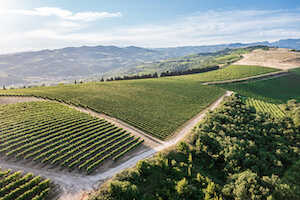-THE ART OF PASQUA WINES IN INTERPRETING VALPOLICELLA: THE SUSTAINABLE, THE ORGANIC AND THE NATURAL
Mizzole, Cascina San Vincenzo, Brasa Coèrta: three projects centred on sustainability and the expression of the Valpolicella terroir

Three vineyards nestled along a single ridge in eastern Valpolicella and cultivated with different approaches to winemaking are the source of three wines whose particular stylistic features express the winery’s sustainable vision.
Again, with these projects, Pasqua Wines, ambassador of Valpolicella in the world, confirms the intention of understanding and developing the terroirs in which it operates, adopting pioneering winemaking styles. Mizzole, Cascina San Vincenzo and Brasa Coèrta are the vineyards strongly marked by sustainability that have generated the wines presented today.
Cultivated organically for ten years, the Mizzole vineyard is an expression of the winery’s commitment to sustainability. The certification process began in 2020 and will be completed next year. Crossed by the Fibbio river, the geological conformation of the Mizzole area is made up of mountain formations and alternating hills and plains that have always made it suited to grape cultivation. Planted in various phases between 1980 and 1990 and located at 200 m above sea level, its calcareous and clayey soil makes it especially suitable for the Corvina, Rondinella, Oseleta, Cabernet Sauvignon and Merlot varieties.
Cecilia Beretta Mizzole Valpolicella DOC Superiore comes from this vineyard. If the style of winemaking in the past highlighted the muscularity and robustness of this wine, since Graziana Grassini began her collaboration with the winery’s team of oenologists in 2018, the basis of the blend has become more delicate and the green notes found in this wine have been softened.
Today, the 2018 vintage is characterized by a red colour tending towards garnet. The aromas of red fruits, wild strawberries and strawberry jam emerge on the nose, but there are also slightly toasted, balsamic and vanilla notes. The mouthfeel reveals soft, silky tannins, good body and freshness.
The certified organic agriculture project has instead been in operation at the Cascina San Vincenzo vineyard since its beginning. The 4-hectare vineyard is located 8 km north on the Mizzole ridge, at an altitude of 350 m above sea level. The calcareous clay soil, typical of the Valpolicella, contains important minerals for the vines, giving rise to elegant and fine products. Corvina, Corvinone, and Rondinella grapes are cultivated. These indigenous vines are about twenty years old and have always been grown organically.
From this single vineyard, Famiglia Pasqua Cascina San Vincenzo Valpolicella Ripasso DOC 2019 offers a bouquet that recalls wild strawberries, strawberry jam, but also citrus notes of light orange peel and cherry. The appassimento process of withering the grapes lends a characteristic aroma.
The body and structure of the wine is perceived on the palate, where the alcoholic component integrates very well; a great freshness emerges with length and persistence that promise longevity. Compared to Valpolicella Mizzole, Ripasso Cascina San Vincenzo has an acidity more marked with fresh and defined aromas due to the difference in altitude between the two vineyards. The Cascina San Vincenzo vineyard is located at a higher altitude.
The Brasa Coèrta vineyard is cultivated using natural farming methods. The pilot project launched in 2017 aims to protect the vineyard as part of the territorial heritage.
The vineyard, part of that of Mizzole, has an area of 1.2 hectares and a density of 5,000 vines per hectare at an altitude of 230 m above sea level. Its calcareous clay soil of alluvial origin supports the cultivation of the Corvina, Rondinella, Croatina, Cabernet Sauvignon and Merlot varieties. Here the almost non-existent technological and human contribution affects the final result and the definition of its extraordinary personality.
Brasa Coèrta Valpolicella DOC 2019 reveals notes of cherry, tobacco and plum jam on the nose, with a persistent mouthfeel and spicy retro-olfactory sensations. The big surprise comes from the antioxidant power of the wine, which seems to recall an addition of sulphates that is not actually present. Being presented today is the second vintage of this project that aims to establish itself in the area of natural agriculture.
Umberto Pasqua, President of Pasqua Wines, commented, “The vocation for sustainability is central to our vision. It is an urgent issue and for us and not just from today, as our projects demonstrate. We are committed to continually doing better and we believe that the path of continuous research characterizes us.”
Riccardo Pasqua, CEO, concluded, “We started experimenting with organic and then with natural cultivation because the optimal characteristics of the vineyards on the Mizzole ridge were favourable to us exploring this path. We are especially satisfied with the result we have obtained: three different and extraordinary oenological expressions of the Valpolicella terroir, which interpret it with coherence and elegance, with different balances and with innovative approaches in the vineyard.”
